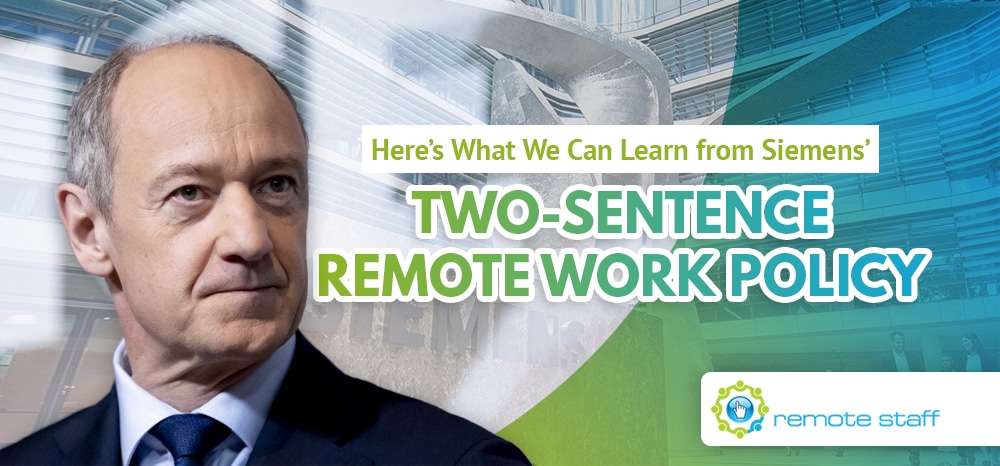Remote work is one topic that can certainly keep a conversation going. Just about everyone who’s heard of and/or experienced it would have an opinion. The internet is also rife with all sorts of advice on how to make outsourcing work for you.
However, one company says it best, and their remote work policy can be summed up in just two sentences. I’m talking about Siemens.
Headquartered in Germany, you probably know this company best for its electronic appliances. If you’re old enough to remember the days before smartphones, theirs were some of the leading cell phones on the market then. Siemens is also a leader in other industries, such as renewable energy, medical equipment, and even transportation.
But let’s go back to the topic at hand. A few months’ back, Siemens announced that their 380,000-strong workforce could “work from anywhere” twice or thrice a week. Apparently, this policy will extend beyond the current pandemic too.
What stood out in their announcement, however, were the following sentences, direct from CEO Roland Busch himself:
“These changes will also be associated with a different leadership style, one that focuses on outcomes rather than on time spent at the office. We trust our employees and empower them to shape their work themselves so that they can achieve the best possible results.”
Let’s break that down, shall we?
Outcomes > Time Spent at the Office

We’re all familiar with hourly wages. To an extent, such fixed wages are understandable. They are the easiest and arguably the fairest way to quantity and compensate for routine and repetitive work.
On the other hand, paying employees with specialised skills for their time rather than for their actual output doesn’t make a lot of sense. Neither is it particularly fair to the employee in question.
Generally, if you’re good at your job, it’ll take you far less time to get things done or to move things forward. If you’re paid hourly despite this, you’ll have to twiddle your thumbs until the clock’s up.
In short, hourly wages penalise rather than reward brilliant employees. A good remote working policy avoids this by focusing on their output rather than the time they spend logged in.
After all, your company is paid for the products and services it comes up with, and not for the time you spend creating them, right?
Trusting and Empowering Your Employees

Okay, so this part is a bit trickier to understand, especially if you’re new to remote work. It’s hard enough to trust your employees when you can’t just walk up to them in a physical space. Thus, the temptation to micromanage is pretty strong, at least at first.
So, what does it mean to “trust and empower your employees?” First, it’s not leaving them to their own devices. No, that wouldn’t help anyone. Total freedom without accountability breeds complacency. Leaving your employees without any guidance or supervision is hardly empowering either.
Instead, it’s all about creating an environment where your remote workers have everything they need to get their work done…and then giving them enough space to do just that.
This entails people-centric management, which takes time to get to know each worker’s circumstances. Clear communication about scope and milestones on each project should be the norm too. There should also be clear guidelines about response times for emails and direct messages and good coaching (as opposed to micromanaging).
Oh, and of course, it helps to have an effective onboarding process as well. This is especially crucial if they’ll be dealing with proprietary techniques or technologies.
Siemens might be a Fortune 500 company, but their straightforward approach can still apply even to the smallest or newest SME. Sure, your remote staffing needs might vary in quantity and function. Yet these principles can still help you craft an effective remote work policy for years to come.
For the specifics, on the other hand, you can count on Remote Staff. With more than a decade’s worth of experience in the industry, a rich pool of diverse Filipino talent ready to start working at any time, and Customer Success specialists trained in smoothing over any possible concerns that may arise, you can’t find a better ally to kickstart your remote work journey with.
Serena has been working remotely and writing content for the better part of the last decade. To date, she's written for Pepper.ph and Mabuhay Magazine, among others, and has churned out more than a thousand articles on everything from The Basics of Stock Market Investing to How to Make Milk Tea-Flavored Taho at home. Hermits, aspiring hermits, and non-hermits with interesting project propositions may email her at serena.estrella10@gmail.com.
























 Zero Recruitment Fee
Zero Recruitment Fee